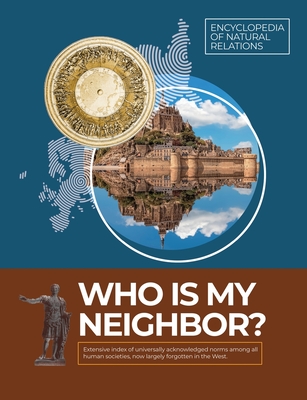Who Is My Neighbor? -

Who Is My Neighbor? -
Some time ago the West lost, or conveniently misplaced, its blueprint in the way of things. This Way was a long known set of experiences concerning how the world operates and how to be human in it. Cut off from those old paths, the modern mind is free to imagine whatever it pleases about these once-given truths. With such freedom comes uncertainty of truth, skepticism of knowledge claims, and confusion about personal and collective identity. The freedom to imagine new sorts of nations, ethnicities, and genders is all of a piece. It's all a "social construct" that can be deconstructed and reformulated.
C.S. Lewis' The Abolition Of Man argued against this pluralist, subjective view of life where truth lies within oneself and thus nothing is really true or real. He claimed that all humans have known some things to be universally true, that is, to correspond to reality or the way of things, apart from place, perspective, and condition. The appendix of Lewis' book contains an index of universally acknowledged norms among all human societies. In that appendix Lewis said,
"The idea of collecting independent testimonies presupposes that 'civilizations' have arisen in the world independently of one another ... It is by no means certain that there has ever ... been more than one civilization in all history. It is at least arguable that every civilization we find has been derived from another civilization..."
This book picks up just one of the themes in Lewis' work and continues it more exhaustively in an area particularly under attack in our time: natural social relations.
THE SECOND EDITION of Who Is My Neighbor? builds upon the first and marks more than a decade of research and study. This is not a work of quote-mining but of exhaustive, time-consuming, yet enjoyable labor in personal, public, and university libraries; in books, documents, articles, essays, speeches, and even manuscript fragments. In order to provide the best and widest scholarship, we have consulted authors, publishers, professors, translators, and other authorities beyond our expertise. The result is a second edition expanded over sixty percent from the original.
PRP: 235.60 Lei
Acesta este Prețul Recomandat de Producător. Prețul de vânzare al produsului este afișat mai jos.
212.04Lei
212.04Lei
235.60 LeiLivrare in 2-4 saptamani
Descrierea produsului
Some time ago the West lost, or conveniently misplaced, its blueprint in the way of things. This Way was a long known set of experiences concerning how the world operates and how to be human in it. Cut off from those old paths, the modern mind is free to imagine whatever it pleases about these once-given truths. With such freedom comes uncertainty of truth, skepticism of knowledge claims, and confusion about personal and collective identity. The freedom to imagine new sorts of nations, ethnicities, and genders is all of a piece. It's all a "social construct" that can be deconstructed and reformulated.
C.S. Lewis' The Abolition Of Man argued against this pluralist, subjective view of life where truth lies within oneself and thus nothing is really true or real. He claimed that all humans have known some things to be universally true, that is, to correspond to reality or the way of things, apart from place, perspective, and condition. The appendix of Lewis' book contains an index of universally acknowledged norms among all human societies. In that appendix Lewis said,
"The idea of collecting independent testimonies presupposes that 'civilizations' have arisen in the world independently of one another ... It is by no means certain that there has ever ... been more than one civilization in all history. It is at least arguable that every civilization we find has been derived from another civilization..."
This book picks up just one of the themes in Lewis' work and continues it more exhaustively in an area particularly under attack in our time: natural social relations.
THE SECOND EDITION of Who Is My Neighbor? builds upon the first and marks more than a decade of research and study. This is not a work of quote-mining but of exhaustive, time-consuming, yet enjoyable labor in personal, public, and university libraries; in books, documents, articles, essays, speeches, and even manuscript fragments. In order to provide the best and widest scholarship, we have consulted authors, publishers, professors, translators, and other authorities beyond our expertise. The result is a second edition expanded over sixty percent from the original.
Detaliile produsului













